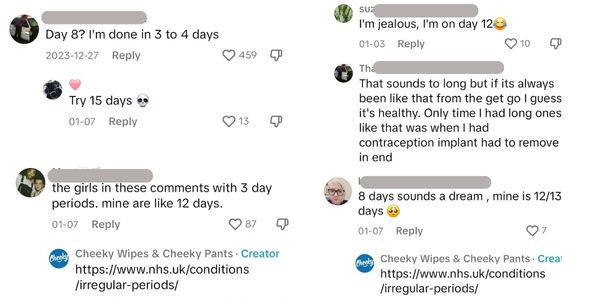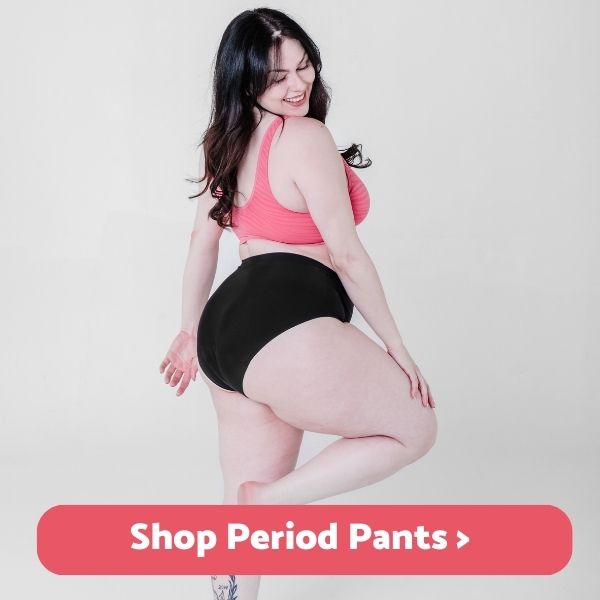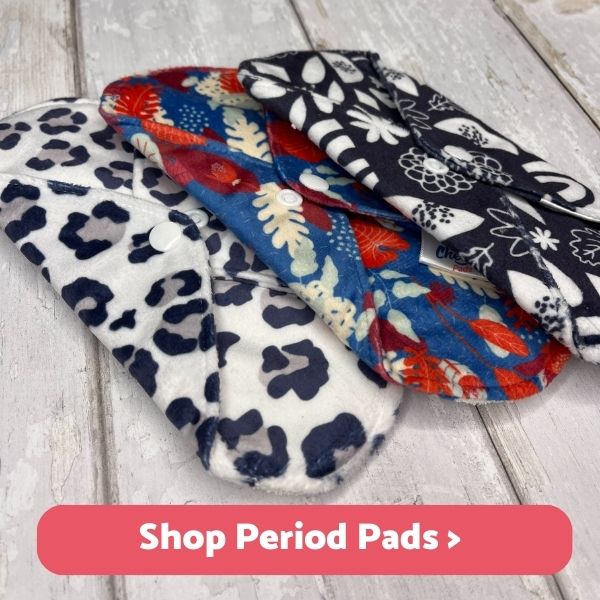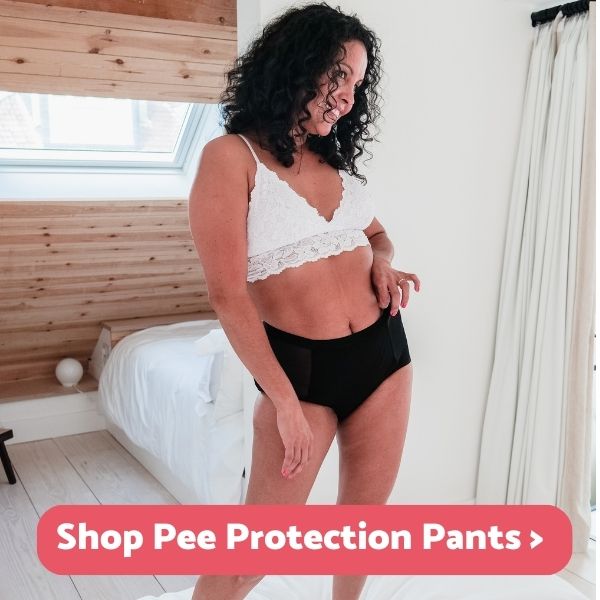How Long Should A Period Last?26 January 2024 | Admin As often happens here at Cheeky Pants, this blog post was inspired by comments on one of our social media posts. It was a piece of tiktok content where the reviewer started the video by saying that she was on day 8 of her period. Here's a selection of the responses... 
So how long should a period last? According to NHS England, a typical period will last between 2 and 7 days in a regular cycle length of 28 days. The average period lasts around 5 days. If your period lasts for longer than 7 days or is so heavy that you have to change your pad or tampon nearly every hour, it's crucial to speak to your doctor about your periods. This is not 'normal' so don't be fobbed off! Keep in mind that your period is still considered “regular” even if it varies slightly from cycle to cycle. As I am in perimenopause, mine vary from up to 42 days apart, down to 19 days, which makes me very grateful for my Cheeky period pants! Factors That Can Impact Period Length1. StressStress can play a significant role in the length of your period and I have certainly found this to be true. When your body is stressed, it can affect hormone levels, potentially leading to irregular menstrual cycles. Finding effective stress management techniques, such as meditation, exercise, or deep breathing, may help regulate your periods. 
"Great products, helpful and friendly service. No longer suffer from thrush due to plastics and periods seem lighter. Would recommend to everyone" Mrs Hiles, Trustpilot 2. WeightWeight can also influence the length of your period. Significant changes in weight, both weight gain and loss, can disrupt hormonal balance, impacting the regularity and length of your menstrual cycle. Although easier said than done, maintaining a healthy weight with a balanced diet and regular exercise may help with a more consistent menstrual cycle. 3. MedicationCertain medications can also affect your menstrual period. On the other hand, some medications may cause irregular bleeding or prolonged periods. These include anticoagulant medicines which are given to people with a high risk of blood clots and some chemotherapy medicines. Chat with your GP if you have concerns about the impact of medication on your menstrual cycle. 
"I was a little sceptical at first about using washable sanitary pads. When I told friends they thought it was ‘gross’. I cannot use tampons due to severe endometriosis and the pain that they cause me. My endo also gives me a very heavy period. I was a little worried that this cloth pads wouldn’t withhold my flow. Well I was totally wrong! I bought a starter kit at first. I had to wait nearly a whole month to use them, and I was excited and nervous! The first day wearing them I kept asking my colleague if she could check if I was leaking!! But nothing! Even with my extra heavy flow. I haven’t even tried with their period pants yet, but I know that this is an option too, even if it’s for peace of mind. When I change my pad, if I’m at home I run it under cold water to remove most the blood. I keep a little Tupperware box in my bathroom out sight, and I put the pad in that after topped up with cold water. Then on the second day I will wash at a low 20 degree, and air dry! I have since bought three more day pads and one more night time pad, this is my second month now and I wouldn’t go back to disposable ones!! Oh, and did I mention they are SO comfortable too!? Thanks Cheeky Wipes!!!" Harriet via Trustpilot 4. Viruses or IllnessesIllnesses, especially those accompanied by fever, can disrupt your menstrual cycle. Your body will focus on fighting the illness, leading to changes in hormone levels and menstrual patterns. Anecdotally, there seems to be evidence that covid19 can cause longer periods. Once you recover, your cycle should return to normal. If your periods continue to be different, see your Dr. 5. PerimenopauseAs I said at the start, perimenopause is doing a great job of stuffing up my previously predictable 28 day cycle. For many women, this means longer periods, although it can also mean less frequent periods. Everyone is different! 6. Ongoing Medical ConditionsHealth conditions can also make your periods longer or cause heavy menstrual bleeding. Pelvic inflammatory disease (pid) is an infection of the female reproductive organs which can cause heavy or long periods. Polycystic ovary syndrome (pcos) can also impact your periods, making them irregular and erratic. Endometriosis is where uterine lining material or material similar to the lining of the uterus grows in other areas of the body. And lastly uterine fibroids are non cancerous growths which are treatable but can cause longer periods. 
"I bought a mixture of period and incontinent panties. I suffer with PCOS and endometriosis, so when I do have my periods they’re extremely heavy and these panties has been such a life saver. I would never go out in fear of leaking through and that hasn’t happened since I’ve switched to Cheeky products. I hate the thought of disposable products going into the landfill. As long as you look after these panties, you’ll get years of use! I can’t recommend these enough. I feel I have a life again. They’re worth every penny I’ve spent. You pay for quality and that’s just what I got!!" L Jesson, Trustpilot 7. Birth ControlSome hormonal birth control, like birth control pills, can regulate periods, making them shorter and lighter. However the flip side of this is that some women find that fitting either a hormonal or non hormonal IUD can cause longer lighter periods or bleeding between periods, which generally settles down over a period of months. SummaryUnderstanding the factors influencing the length of your period is essential for maintaining overall reproductive health. If your periods are regularly longer than 7 days, it's important to consult with a healthcare professional to rule out underlying issues. For more information on period pants and other reusable period products, feel free to drop us a line ( we LOVE to chat pee, poo and periods!) or explore our blogs below: About the Author: Helen Rankin founded Cheeky Wipes, the original reusable wipes kit back in 2008 after disposable wipes caused her eczema to flare up. 4 kids later, internal period protection such as tampons or menstrual cups were no longer an option for her and she went on to develop their range of 'Simple Reusables' to include period pants, reusable panty liners and reusable sanitary pads. The Cheeky customer services team pride themselves on providing honest, friendly advice and just LOVE to chat pee, poo and periods all day long, helping people make the switch to reusables! The Company was recognised for their hard work in developing environmentally friendly products with the Queens Award in Enterprise for Sustainable Development in 2021. |